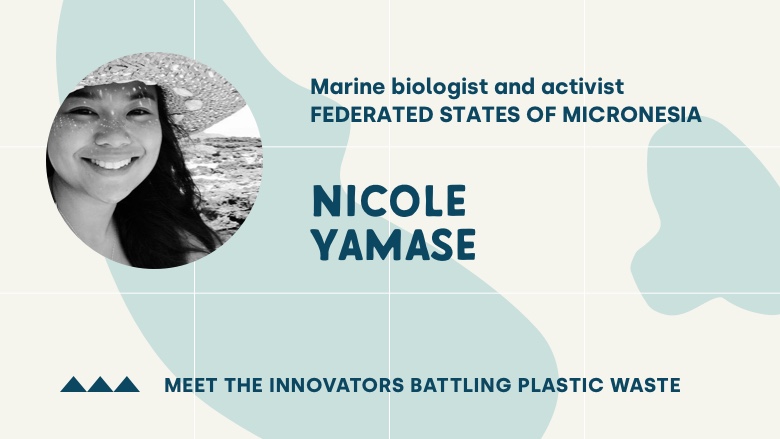Nicole Yamase was born in Pohnpei, in the Federated States of Micronesia (FSM) and is a PhD candidate in the Marine Biology Graduate Program at the University of Hawaiʻi at Mānoa (UHM). She was recently part of the Young Pacific Leaders Conference and is working to raise awareness about the importance of marine plants and how they are affected by climate change.
What inspired you to study marine biology?
I was fortunate to grow up on a number of islands in the Micronesia region.
During my childhood years, I remember snorkeling with my Dad who would point out different corals, fish and plants. I used to think: ‘These islands are tiny yet are so rich in diversity!’ Since then, I’ve been asking myself: ’Will I be able to share the same experience with my kids and grandkids? Will they be able to see all this diversity – or will it all be gone?’
This sense of loss inspired me to pursue my education in biology; to not only work towards preserving the biodiversity in Micronesia, but to also help local communities build resilience against climate change.
Why did you choose marine plants as the focus of your PhD research?
When it comes to marine biology, the importance of algae is often overlooked. People don’t get excited about plants, and often expect me to talk about dolphins or whales. We don’t realize that the marine plant community serves as the foundation of the food web and is the major source of energy on a reef. What will happen if the marine plants disappear? Without plants, the whole food web will collapse. Loss of fish for food will put severe strains on all aspects of a familyʻs dynamic as well as livelihoods of Pacific Islanders.
How is plastic pollution impacting the marine plant community?
Marine plants release spores or gametes that settle on the ocean floor. When our reefs are covered with plastic, this decreases our plants’ ability to successfully settle and grow. Chemicals can also be absorbed by marine plants, which can negatively affect their productivity and put organisms at risk, as many of these depend on the plant community for food and shelter.
Plastics can also serve as a vector for invasive marine plants to be introduced to different parts of the reef or other locations. This is the same idea of how introduced species “hitch hike” on floating objects in the ocean. As a result, invasive species can change the reef community over a short period of time due to their fast growth and reproductive strategies.
What advice do you have for other Pacific Islanders looking to get involved in reducing plastic waste?
We all need to be responsible on land in order to make a positive impact on our marine community. There are simple, achievable, and affordable solutions that the FSM can adapt or continue to do. These are ways we can sustainably utilize our abundant resources, instead of relying on imported plastics to meet our needs.
It’s important to make daily conscious decisions. Ask yourself: do I really need a straw or that plastic bag? Should I bring my own utensils instead of receiving plastic ones from the local market? These small changes will have a ripple effect starting from yourself to your families and friends, to your jobs or schools, and then to your whole community.
What motivates you?
Recently, I was part of the 6th Young Pacific Leaders (YPL) Program. It was both a humbling and powerful experience to be surrounded by other young Pacific leaders who share the same passion. Being part of that cohort made me realize that we are the next generation our country needs to invest in. I am very eager to return home to share my knowledge and join the fight against marine pollution and climate change.
What are your hopes for the future of the Pacific?
I believe the success of a community depends on the success of the youth. My hope for the future is to see more investment (scholarships, resources, time) in young native students. There is no one better to help a community other than its native people who have a unique cultural connection to the land and sea.
Of course, there will be cultural barriers that we will need to carefully navigate around. Two challenges that I face today are being young and being female. Being female in a male-dominant culture and sharing my ideas at a meeting is certainly a challenge for me because women are expected to just listen.
So, imagine what our native youth can accomplish if they were given the chance to receive higher education, proper training, and the right mentorship. My final hope is that they will be better able to navigate through the inevitable challenges of life on tropical islands over the next 50 years.

